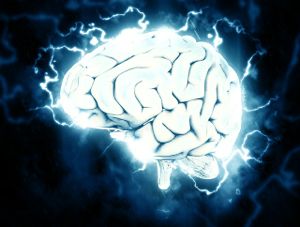If you’re 40 years old or older, it’s time to find out how to boost brainpower.
I hate to be the bearer of bad news, but the truth is that your brain isn’t the same as it was when you were younger.
Age causes a number of things to change in your gray matter, and that can affect your writing routine, output, and productivity.
Fortunately, you don’t have accept these changes lying down. Below are some suggestions for keeping your brain sharp, as well as seven brain-managing recommendations for writers 40 and older.
 Five Major Age-Related Brain Changes that Affect Writers
Five Major Age-Related Brain Changes that Affect Writers
Researchers have found that just like the body, the brain goes through natural changes with age.
According to a 2006 study, as we get older, the brain actually shrinks, particularly in the area of the frontal cortex—which is responsible for future planning, judgment, attention span, and decision-making skills. There are changes in levels of neurotransmitters and hormones, in cells and blood vessels, and in the brain’s white matter.
The changes are not just physical, though. Cognition (thinking) tends to slow, too, in a number of ways. In general, things just take a little bit longer.
In one study, for example, participants worked on a writing task—substituting symbols for numbers. Those who were in their 20s performed the task about 75 percent faster on average than those who were in their 70s.
Boost Brainpower: Five Changes that Affect Writers
In addition to the overall slower pace of our thinking, there are five particular changes that can affect writers and their work.
What was I doing?
After the age of 40, your ability to focus may decline, and we all know how important focus is to writing. This decline shows up most when you’re trying to multitask on something.
Let’s say you’re working on a chapter and you’re distracted by your phone because of an email or text message. It will take you longer to switch back and forth between those two tasks, which could mean that a single distraction is enough to destroy your writing period.
Wait, did my heroin have red hair or brown hair?
Age affects your ability to keep multiple pieces of information in your mind at the same time. Novel writers, beware! If you’re keeping track of several characters in a book, you could find that this becomes more difficult after the age of 40.
Pretty soon your blue-eyed character has brown eyes, your cowboy is wearing a hoodie, and your heroine who grew up in New York is suddenly from California.
What was that word?
An aging brain has a harder time recalling that one right word you’re looking for. This can be super frustrating for writers. You’re in the middle of the scene and you know the word you want, the only word that will work, and you just can’t get it out of the recesses of your brain.
Also known as the “tip-of-the-tongue” experience, you think and you think and the darn word just won’t come, and what are we writers without the right words?
I can’t figure this stupid website out!
As you get older, you may find that it takes you longer to learn new things. (Not good news, considering the accelerating pace of publishing and marketing technology.) Particularly your ability to retain and recall information from something you read recently may decline.
This can make it more difficult not only to learn something new, but to retain an idea that hits you in the shower. As you age, your ability to hold onto that new idea fades, and you may find by the time you get out and dry off, it’s disappeared.
Is my career going the right way?
Defining a problem and making the right decision for a solution requires a high-level of brainpower, and this, too, can slow down with age. Older adults can have a harder time actually conceptualizing the problem and making a good decision about it.
If your books aren’t selling well, for example, you need to examine the issue from every angle to determine exactly why, and that may become a bit more difficult to do as you get older. Next, you need to decide what actions to take to fix it, and that requires savvy decision-making, which may also be harder for you to do.
 Boost Brainpower: Lifestyle Changes Support a Healthy, Aging Brain
Boost Brainpower: Lifestyle Changes Support a Healthy, Aging Brain
The first thing writers can do about all this is to take care of themselves, physically. Studies have shown that everything you do to protect your heart—eat well, exercise regularly, reduce stress, maintain a healthy weight—also helps protect your brain.
In one study, researchers found that vigorous, daily walks taken three times a week improved memory and reasoning, with another study showing that these types of walks can also encourage the growth of new brain neurons while increasing the volume of white matter. In other words—no matter what you do, don’t neglect your regular exercise!
Limiting alcohol intake helps (avoiding excess), as do strong supportive relationships, avoiding smoking, and eating lots of fruits and vegetables, as well as some omega-3 rich fatty fish.
 7 Ways Writers Can Outsmart the Aging Brain and Boost Brainpower
7 Ways Writers Can Outsmart the Aging Brain and Boost Brainpower
Though the lifestyle suggestions above can help you maintain a healthy, sharp brain as you age, you’re still likely to notice that sometimes, your brain just doesn’t respond as quickly as you’d like it to, particularly when you need it for a writing-related task. Below are seven tips to help you keep these changes from slowing you down.
Don’t multitask!
Since your brain can focus on only one thing at a time, true multitasking is actually impossible. Instead, people quickly switch from one task to another. As mentioned, that becomes harder with age, and it tends to take longer to go back and forth.
Don’t risk your writing time. Shut down all possible distractions including your cell phone, internet, TV, etc. when you’re about to write, so you don’t waste time responding to something that isn’t that important anyway. Make it super easy for your brain to focus on your scene, instead.
Boost Brainpower—Use charts and lists to keep track of characters/timelines.
This is a good idea no matter what age you are, but if you’re 40 or older, it tends to become necessary. If you want your characters to stay consistent from chapter to chapter (or book to book), and you want your timelines to make sense, you need to give yourself a tool that will help you do that.
There are a lot of options out there—you can simply use an Excel spreadsheet, or try Trello to keep track of your plotlines. (Author Sandy Fussell shares her methods with Trello on her Writing and Wellness feature.)
Take notes on what you read/learn.
Realize that just reading something probably isn’t enough to retain it. If you take a workshop or simply use Internet posts or books to learn something new, you’ll be more likely to benefit from it if you actually take notes by hand during the learning process.
There’s something about the physical act of writing that gets the information into our brains. In fact, in one study of university students, researchers found that taking notes in long-hand was superior both for preserving recall and for promoting successful application of the information.
Boost Brainpower—Use “dummy” words.
When that perfect word won’t come to mind, don’t waste valuable writing time trying to figure it out. Scientists have found that “thinking harder” about it doesn’t help.
What does help is going on to another activity. That means the word will probably come to you later, while you’re driving to work or something. So simply put “BLAH” or “WORD” in the scene, highlight it in red if you like, and move on.
Keep notebooks everywhere to write down ideas.
This is a good idea for writers of any age, but particularly as you get older, you can’t rely on your memory. If a good idea strikes you, get it down right away.
You can use your cell phone note app in most cases, but that won’t work in the shower—have a notebook sitting nearby on the sink or use lipstick on the mirror!
Boost Brainpower—Let music help you.
If you’re having trouble focusing on your story, turn on some tunes. According to a 2007 study, music engages areas of the brain involved with paying attention. Other studies have shown that classical music can help boost cognition. Music has also been found to help the body and mind to relax, so if you’re stressed out before a writing period, listening to relaxing music may help you zero in on your characters’ lives, instead.
Challenge yourself regularly.
Studies are iffy on whether or not crossword puzzles and the like can help stave off brain decline, but one thing they agree on is that learning new things—especially things that force you out of your comfort zone—do the trick.
Learning a new skill like photography, a new language, or even quilting helps improve memory, slows age-related cognitive decline, and can even stimulate new cell growth in the brain.
You can boost your brainpower and your writing career by making sure to sign up for a writing workshop, marketing class, or something similar every year. Continually push yourself to learn more, and your brain will be happy about it.
Have you noticed changes in your writer’s brain after turning 40?
Sources
Begley, S. (2010, June 17). The Science of Aging Brains. Retrieved from http://www.newsweek.com/science-aging-brains-73219
Howieson, D. B. (2015, December 1). Cognitive Skills and the Aging Brain: What to Expect. Retrieved from http://www.dana.org/Cerebrum/2015/Cognitive_Skills_and_the_Aging_Brain__What_to_Expect/
NPR. (2016, April 17). Attention, Students: Put Your Laptops Away. Retrieved from https://www.npr.org/2016/04/17/474525392/attention-students-put-your-laptops-away
Peters, R. (2006). The Ageing Brain. Postgrad Med J., 82(964), 84–88. doi:10.4324/9780203970973
Silverman, L. (2014, May 5). Learning A New Skill Works Best To Keep Your Brain Sharp. Retrieved from https://www.npr.org/sections/health-shots/2014/05/05/309006780/learning-a-new-skill-works-best-to-keep-your-brain-sharp
Solan, M. (2016, April 27). Back to school: Learning a new skill can slow cognitive aging – Harvard Health Blog. Retrieved from https://www.health.harvard.edu/blog/learning-new-skill-can-slow-cognitive-aging-201604279502
Stanford Medicine. (2007, August 1). Music moves brain to pay attention, Stanford study finds. Retrieved from https://med.stanford.edu/news/all-news/2007/07/music-moves-brain-to-pay-attention-stanford-study-finds.html


Fascinating article and one that will serve me well. I had a comment on Number 2 above – Using Lists and Charts to Keep Track of Characters/Timelines. I’m one of those Pantser writers and I just listen and watch my characters, as I barrel full-steam ahead with plot and story as they develop. I feel driven to write and see outlining as a distraction for the most part. As I heard someone say – To a pantser, the first draft is the outline. So true for me. But that said, I do have some backup help.
First, I draw up a rough character sketch based on what I see and hear on initial creation of my characters. Second, I turn to Astrology to get a chart for my characters. I don’t “put together” what I think is a perfect birth chart. Instead, I figure out how old my character is, when he would have been born, intuit what Sun Sign he has to be for this story, then I search through an Ephemeris (a book of where planets were on certain dates), find the birth date and time that best fit my needs, and draw up a chart. But along with my basic needs for this character, I now also have a whole chart, chosen at random, of a person that could actually have been born at the time and place I have chosen. And the unforeseen parts of that chart now become part of my character’s personality – Moon in Scorpio, he’s revengeful when emotionally wronged; Mars in Pisces, his strength is subtle, yet strong; or Sagittarius Ascendant, he is quite the life of the party and great storyteller. With the chart before me keeping me in the guidelines of what that horoscope can and cannot do, and listening and watching my characters, my fingers just rip away.
A couple other things that help me – I create a Backwards Timeline where I make notes of what happened on each day in the story, in brief, so I can refer back to that to see the gist of what happened when. And last, but not least, I make great use of the Find Feature 🙂
Thank you for this great article! Oh, and I now have my office radio tuned to Classical Music!
From a pantser to a pantser—that sounds like a fun way to create character sketches. Thanks for the idea!
LOL — I’m long past 40, and yes, the changes keep on coming. The worst part for me is how quickly I think of something I need to do and how quickly I can forget it if I stop long enough to get a drink of water or pet the dog. I’ve learned to keep plenty of note pads around as well as an upstairs and a downstairs calendar (and keep them synced by carrying a note from one to the other).
I don’t have as much trouble with the computer and electronic gadgets for some reason, and I even remember most of my random letter/number passwords without looking them up. Can’t explain that. But a simple thing like remember five items to buy at the grocery store without taking a list? Forget about it. 😀
Yes, that happens to me too, Pat. So frustrating! You sound like my mom with numbers—she can remember everyone’s birthday! Amazing!